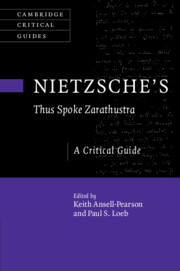Book contents
- Nietzsche’s Thus Spoke Zarathustra
- Cambridge Critical Guides
- Nietzsche’s Thus Spoke Zarathustra
- Copyright page
- Epigraph
- Contents
- Contributors
- Acknowledgments
- Note on Texts, Translations, and References
- Abbreviations
- Introduction
- Chapter 1 Laughter As Weapon
- Chapter 2 Philosophy As a Way of Life in Thus Spoke Zarathustra
- Chapter 3 What Makes the Affirmation of Life Difficult?
- Chapter 4 Zarathustra’s Response to Schopenhauer
- Chapter 5 Nietzsche’s Naturalism and Thus Spoke Zarathustra
- Chapter 6 Nietzsche’s Solution to the Philosophical Problem of Change
- Chapter 7 Zarathustra’s Moral Psychology
- Chapter 8 Zarathustra’s Great Contempt
- Chapter 9 The Great Politics of Thus Spoke Zarathustra
- Chapter 10 Joyful Transhumanism
- Chapter 11 Nietzsche on the Re-naturalization of Humanity in Thus Spoke Zarathustra
- Bibliography
- Index
- Cambridge Critical Guides
Chapter 3 - What Makes the Affirmation of Life Difficult?
Published online by Cambridge University Press: 09 June 2022
- Nietzsche’s Thus Spoke Zarathustra
- Cambridge Critical Guides
- Nietzsche’s Thus Spoke Zarathustra
- Copyright page
- Epigraph
- Contents
- Contributors
- Acknowledgments
- Note on Texts, Translations, and References
- Abbreviations
- Introduction
- Chapter 1 Laughter As Weapon
- Chapter 2 Philosophy As a Way of Life in Thus Spoke Zarathustra
- Chapter 3 What Makes the Affirmation of Life Difficult?
- Chapter 4 Zarathustra’s Response to Schopenhauer
- Chapter 5 Nietzsche’s Naturalism and Thus Spoke Zarathustra
- Chapter 6 Nietzsche’s Solution to the Philosophical Problem of Change
- Chapter 7 Zarathustra’s Moral Psychology
- Chapter 8 Zarathustra’s Great Contempt
- Chapter 9 The Great Politics of Thus Spoke Zarathustra
- Chapter 10 Joyful Transhumanism
- Chapter 11 Nietzsche on the Re-naturalization of Humanity in Thus Spoke Zarathustra
- Bibliography
- Index
- Cambridge Critical Guides
Summary
The problem, according to Katsafanas, is the tendency to negate what presently exists in favor of an imagined future ideal. This tendency is dramatized in Zarathustra’s overwhelming urge to be rid of the rabble and the small human (ZII: “Rabble”; ZIII: “Convalescent”). At the same time, however, Nietzsche insists that life-affirmation should be unconditional, meaning that it should not depend on the possibility of removing objectionable elements from life. This is why Zarathustra needs the thought of life’s eternal recurrence. Since all such objectionable elements must eternally recur as the same, his attitude to this thought serves to reveal any conditionality in his claim to affirm life. Zarathustra must seek to affirm the eternal recurrence of life because only in this way will he be pursuing his higher values while at the same time affirming life as it is actually lived in the present moment.
- Type
- Chapter
- Information
- Nietzsche's ‘Thus Spoke Zarathustra'A Critical Guide, pp. 62 - 82Publisher: Cambridge University PressPrint publication year: 2022
- 12
- Cited by

